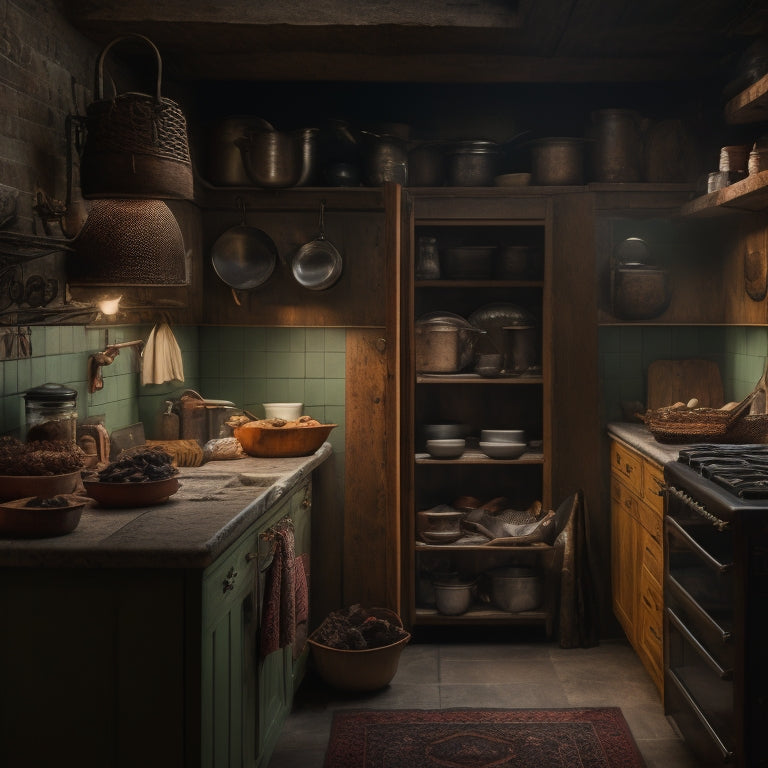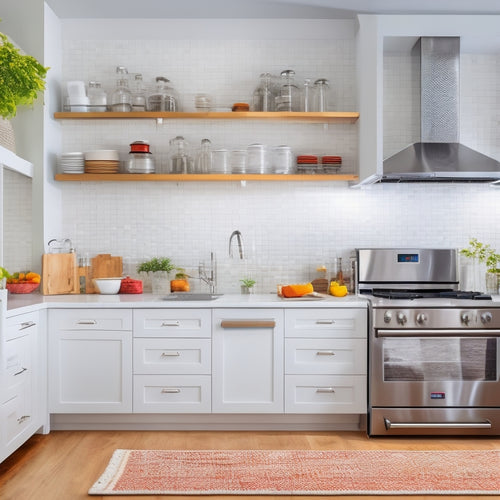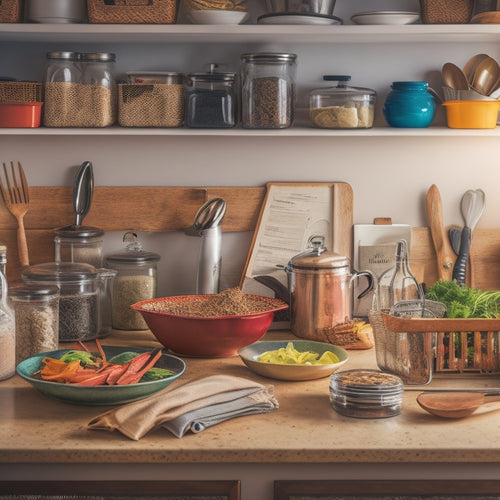
What's Hiding in Your Kitchen Cabinets?
Share
Your kitchen cabinets are likely hiding a mix of expired food, dusty dishware, and cluttered utensil zones, all of which can negatively impact your mental well-being, daily life, and cooking habits. Expired ingredients can lead to foodborne illnesses, while cluttered countertops and shelves can contribute to stress and anxiety. Take a closer look, and you might be surprised at what you find. From dirty dishware to unnecessary gadgets, your cabinets may be harboring more than just leftover ingredients. Discover the secrets hiding in your kitchen and learn how to transform your space into a calm, functional haven that inspires culinary creativity.
Key Takeaways
• Cluttered kitchen cabinets can hide expired or spoiled food, leading to a unsafe kitchen space and negatively impacting mental well-being.
• Disorganization in cabinets can breed bacteria and odors from dirty dishware, contribute to food waste, and hinder kitchen functionality.
• Hidden clutter can lead to Storage Anxiety, procrastination, and a lack of culinary passion, making it essential to address kitchen cabinet issues.
• Identifying and addressing cluttered areas, such as utensil zones, can help streamline kitchen functionality, reduce stress, and increase efficiency.
• Transforming kitchen cabinets from chaotic to calm spaces can promote a clearer mind, healthier lifestyle, and more intentional living.
Kitchen Cabinet Clutter Epidemic
You're not alone if you feel overwhelmed by the sheer volume of items stacked haphazardly inside your kitchen cabinets, because cluttered cabinets have become a ubiquitous problem in many modern homes. According to Cabinet Anthropology, the study of human behavior in relation to kitchen storage, cluttered cabinets are often a reflection of our busy lifestyles and lack of intentional organization. Kitchen Psychology suggests that our kitchen spaces can greatly impact our mental well-being, and cluttered cabinets can contribute to feelings of anxiety and stress.
The good news is that you have the power to break free from the cycle of clutter. By acknowledging the emotional and psychological factors driving your kitchen cabinet clutter, you can begin to make intentional changes. Start by taking everything out of your cabinets and sorting items into categories. This will help you identify what you use regularly and what can be donated or discarded.
Hidden Dangers of Disorganization
As you open your kitchen cabinets, you're faced with a reality check: disorganization can lead to more than just frustration. It can also pose hidden dangers, from expired or spoiled food to hazardous materials lurking in the shadows.
You'll want to tackle these issues head-on to make sure your kitchen remains a safe and healthy space.
Cluttered Shelf Syndrome
Behind the closed doors of your kitchen cabinets, cluttered shelves are silently threatening your productivity, safety, and sanity. You might think it's just a minor annoyance, but the truth is, Cluttered Shelf Syndrome is a real phenomenon that affects your daily life.
It's a result of Shelf Psychology, where your brain associates clutter with stress and anxiety. Every time you open your cabinet doors, you're met with a visual representation of your to-do list, making you feel overwhelmed and guilty. This Storage Anxiety can lead to procrastination, as you avoid dealing with the mess altogether.
The consequences of Cluttered Shelf Syndrome are far-reaching. You waste time searching for misplaced items, risk breaking fragile dishes, and even compromise your kitchen's overall cleanliness. Moreover, the mental toll of living with clutter can affect your mood, relationships, and overall well-being.
It's time to take control of your kitchen cabinets and liberate yourself from the grip of Cluttered Shelf Syndrome. By acknowledging the psychological impact of clutter and taking small steps towards organization, you can regain your sense of calm, confidence, and kitchen harmony.
Piled-Up Pantry Perils
Your pantry, often overlooked and undermanaged, harbors hidden dangers that can have serious consequences for your health, wallet, and kitchen efficiency.
When food items are stacked haphazardly, it's easy to forget what you have, leading to expired or spoiled food that ends up in the trash. This results in food waste, which not only hurts your wallet but also contributes to environmental problems.
A disorganized pantry also makes meal prep a nightmare, causing you to spend more time searching for ingredients and preparing meals.
Chaos Behind Closed Doors
When you open your kitchen cabinets, you're often met with a jumbled mess of dishes, gadgets, and food items that can pose hidden dangers to your health and safety. Behind the closed doors, chaos reigns supreme, hiding secret habits and hidden shame. The disorganization can lead to expired or spoiled food, broken dishes, and even pests and rodents making themselves at home. It's crucial to face the music and confront the mess.
As you dig deeper, you may discover that the clutter isn't just physical, but also emotional. The shame of not being able to keep up with cleaning, the anxiety of not knowing what's lurking in the back of the cabinet, and the guilt of wasting food and resources can weigh heavily on your mind.
However, it's vital to recognize that this chaos isn't a reflection of your worth as a person. It's simply a sign that it's time to reassess your priorities and habits.
Take control of your kitchen cabinets, and you'll be surprised at how liberating it feels. Start by clearing out the expired and broken items, and organize what's left in a way that makes sense to you. By doing so, you'll not only create a safer and healthier environment but also free yourself from the burden of hidden shame and secret habits.
Signs You Need a Makeover
Do cluttered countertops and expired ingredients have you feeling like a culinary amateur, stuck in a rut? It's time to take a closer look at your kitchen and assess whether it's reflecting your personal style.
Are you uninspired by the same old recipes and cooking techniques? Do you feel like your kitchen is lacking design inspiration? If so, it may be a sign that you need a makeover.
Take a step back and evaluate your cooking habits and the overall aesthetic of your kitchen. Are there certain ingredients or cooking tools that you've been wanting to try but haven't had the space or motivation to incorporate?
Are there design elements that you love but haven't found a way to incorporate into your kitchen? Identifying these gaps can help you pinpoint areas for improvement and spark inspiration for a kitchen makeover.
Common Kitchen Cabinet Crimes
As you open your kitchen cabinets, you're likely to uncover a few common crimes that are compromising your kitchen's functionality.
You might find dirty dishware stored alongside clean dishes, expired food hiding behind newer items, or cluttered utensil zones making it hard to find what you need.
It's time to face these kitchen cabinet crimes and get your kitchen back in order.
Dirty Dishware Storage
Behind your kitchen cabinets' closed doors, stacks of dirty dishware often linger, breeding bacteria and odors that can spread to clean dishes and utensils. This dirty dishware storage habit is a common kitchen cabinet crime that can contaminate your entire kitchen.
You're not alone in this struggle, but it's time to take control and free yourself from this unhealthy habit.
To break the cycle, prioritize dishware sanitizing. Wash and sanitize your dishes immediately after meals, or load them into the dishwasher. For items that require handwashing, use hot soapy water and dry them thoroughly to prevent water spots.
When it comes to storage, adopt clever solutions. Use cabinet dividers or baskets to separate clean from dirty dishware. Designate a specific cabinet or shelf for dirty dishes, making it easy to access and clean them. Consider investing in a dish rack with a built-in utensil holder to maximize counter space.
Expired Food Hiding Spots
You've likely found yourself rummaging through kitchen cabinets, only to stumble upon expired or spoiled food, hidden from view but still taking up valuable space. This common kitchen cabinet crime not only wastes space but also contributes to food waste, a significant problem in many households.
It's easy to forget about the can of beans you bought six months ago or the jar of sauce that's been lingering since last year's holiday dinner. However, it's essential to stay on top of your food's shelf life to avoid unnecessary waste.
Take control of your kitchen by regularly checking expiration dates and using the 'first in, first out' rule. Store newer items behind older ones, ensuring that the oldest items are consumed or discarded before they spoil. Designate a specific shelf or bin for items nearing expiration, and make a point to incorporate them into your meal planning.
Cluttered Utensil Zones
Your kitchen cabinets are breeding grounds for cluttered utensil zones, where tangled messes of spatulas, whisks, and wooden spoons threaten to overwhelm your cooking routine. You're not alone in this struggle; many of us are guilty of utensil hoarding, thinking we might need that obscure gadget someday.
But the reality is, a cluttered utensil zone leads to tool overload, making it harder to find what you need when you need it.
It's time to liberate your kitchen from the chaos. Start by categorizing your utensils into groups, such as baking, cooking, and serving. Then, purge any duplicates or items you haven't used in the past year. Consider investing in a utensil organizer or divider to keep your remaining tools tidy and accessible.
By streamlining your utensil zone, you'll reduce stress and increase efficiency in the kitchen. Remember, a clutter-free kitchen cabinet is a key to a more enjoyable cooking experience.
From Chaos to Calm Spaces
Cluttered kitchen cabinets can suffocate your sense of calm, but by initiating a few strategic organizational systems, you can transform these chaotic spaces into serene havens.
It's time to commence on a mindful renovation, where every decision is intentional and purposeful. Begin by purging items you no longer need or use, and consider adopting a cozy minimalism approach. This means keeping only what brings you joy or serves a functional purpose.
As you declutter, think about how you want to feel in your kitchen. Do you want to feel relaxed and focused, or overwhelmed and anxious? By creating a peaceful environment, you'll be more inclined to cook, socialize, and enjoy quality time with loved ones.
Consider the layout of your cabinets, and optimize storage to reduce visual clutter. Invest in dividers, baskets, or shelves that promote easy access and visibility. By streamlining your kitchen cabinets, you'll create a sense of calm and control, allowing you to focus on what truly matters – nourishing yourself and others.
Kitchen Cabinet Organization Hacks
By implementing a few clever hacks, such as the 'zone defense' approach or the 'bucket system,' you can maximize your kitchen cabinet's storage capacity and keep frequently used items within easy reach. These hacks help create a sense of order and calm in your kitchen, making meal prep a breeze.
Customizable systems, like adjustable shelves or dividers, allow you to tailor your cabinet organization to your unique needs. Colorful containers can add a pop of personality to your space while keeping similar items, like spices or oils, neatly organized.
Consider assigning a specific zone for each type of item, such as a 'baking zone' or 'cooking zone,' to streamline your workflow. By implementing these hacks, you'll be able to find what you need quickly, freeing up time and energy for more important things.
With a little creativity and planning, your kitchen cabinets can become a haven of efficiency and productivity.
Decluttering for Better Living
Sort through your kitchen cabinets and rid yourself of unnecessary items, freeing up space and reducing stress in the process. As you declutter, you'll not only create a more organized kitchen, but you'll also cultivate mindful habits that promote personal growth. By letting go of clutter, you're making room for what truly matters – a clearer mind, a healthier lifestyle, and a sense of liberation.
| Clutter Type | Why It Holds You Back | Freedom Gained |
|---|---|---|
| Expired food | Weighs on your mind, wasteful | Fresh starts, reduced guilt |
| Duplicates | Causes decision fatigue, cluttered space | Simplified choices, more room |
| Broken items | Energy drain, frustration | Peace of mind, problem solved |
As you declutter, remember that every item you remove is an opportunity to create a more intentional, organized, and peaceful space. By adopting mindful habits, you'll become more aware of your consumption patterns, waste less, and live more intentionally. So, take the first step towards a clutter-free kitchen and a clearer mind – start sorting, and discover the liberation that comes with it.
Frequently Asked Questions
How Do I Maintain Organization After the Initial Decluttering Process?
To maintain organization, you'll develop daily habits like putting items back in their assigned spots and conduct ongoing evaluations to identify areas for improvement, ensuring your space remains clutter-free and peaceful.
Are Custom Cabinet Organizers Worth the Investment?
You're wondering if custom cabinet organizers are worth the investment? Consider design flexibility and budget breakdown: weigh the cost against the benefits of a tailored system that maximizes space and boosts efficiency, giving you the liberation you crave.
What's the Best Way to Store Heavy Cookware and Baking Dishes?
When storing heavy cookware and baking dishes, you'll want to prioritize weight distribution to prevent cabinet damage. You're doing it right by using cabinet dividers to separate and stabilize your heaviest items, ensuring a safe and organized kitchen space.
Can I Use the Backs of Cabinet Doors for Storage?
You're wondering if you can utilize the backs of cabinet doors for storage. The truth is, yes, you can! Install hidden hooks or smart panels to maximize space, keeping frequently used items within easy reach, freeing up precious cabinet real estate.
How Often Should I Clean and Reorganize My Kitchen Cabinets?
You should clean and reorganize your kitchen cabinets every 3-6 months to maintain your Kitchen Goals and achieve a Cabinet Refresh, ensuring a clutter-free space that sparks joy and boosts productivity.
Related Posts
-

Optimize Your Kitchen Storage With 7 Simple Hacks
You're already wasting valuable kitchen space without realizing it, and it's likely due to a lack of strategic storag...
-

7 Essential Tools to Tame Your Kitchen Chaos
You're one step away from transforming your kitchen into a haven of efficiency and calm. Start by decluttering your c...

